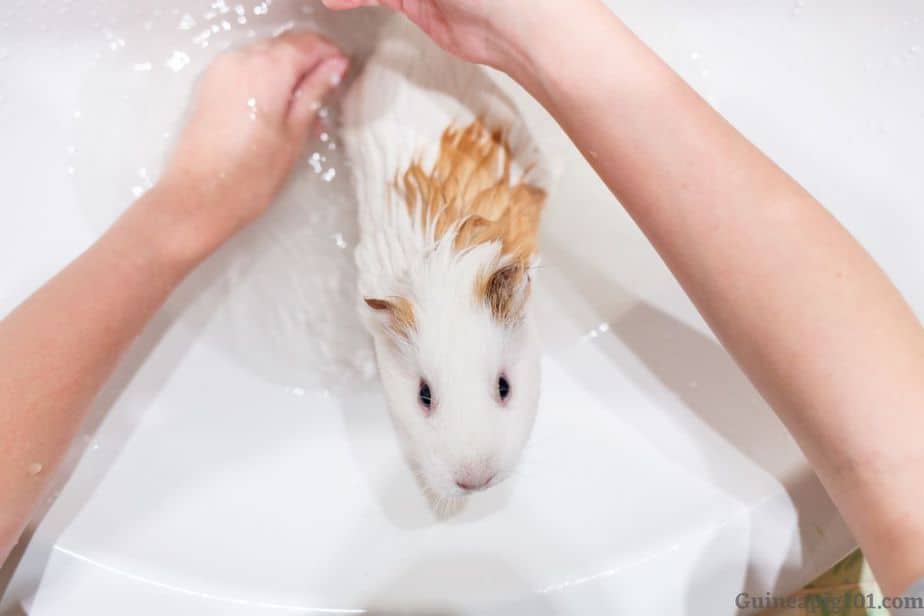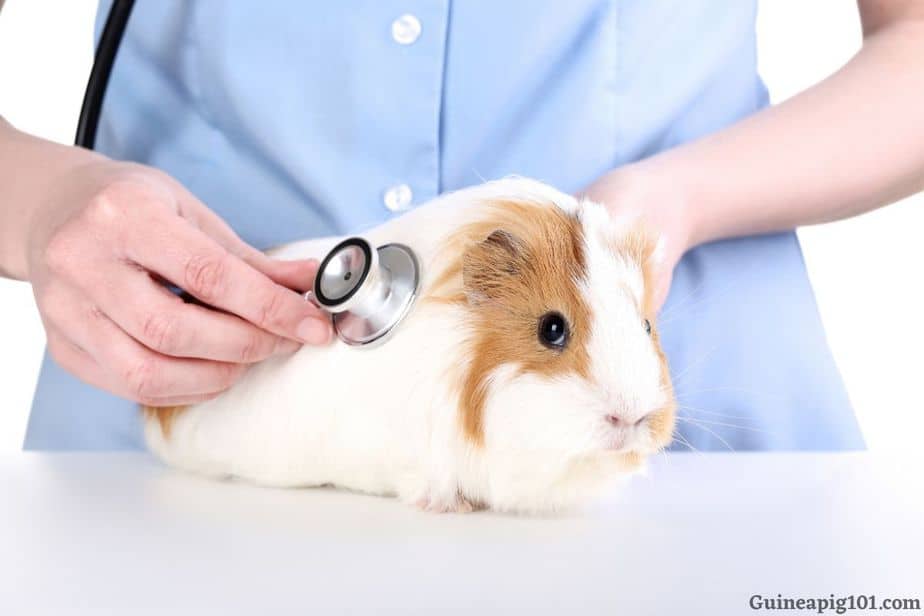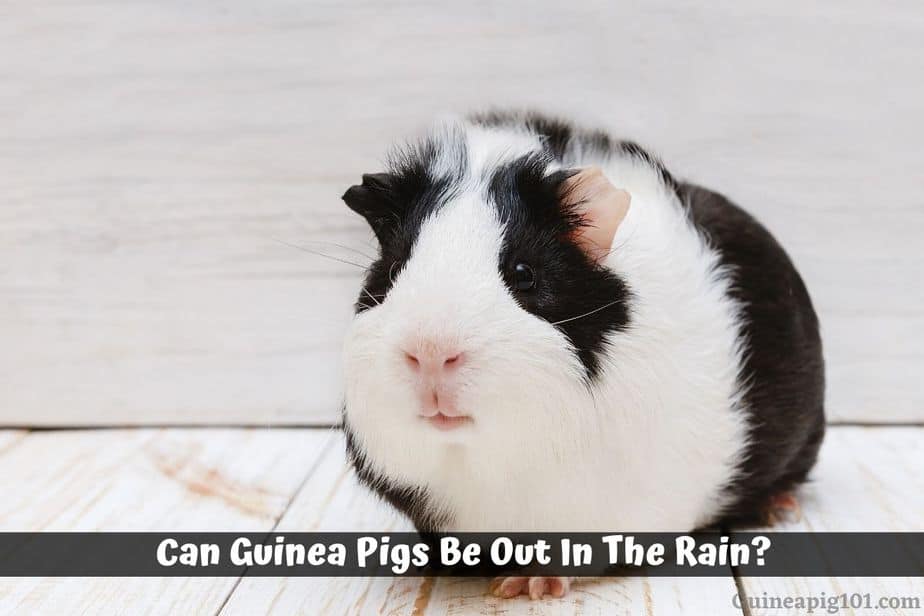If you want to house your guinea pig outside or even play with them in your yard, rain can be a major hurdle. Guinea pigs don’t enjoy taking a bath, so will they enjoy the rain? Can you let your guinea pigs be out in the rain? I did thorough research, and here is what I have learned.
The major risk of letting your guinea pigs out in the rain is the drop in temperature, which can lead to hypothermia. So, if you are housing your guinea pig outside and they have a shelter to hide when they want to, it shall not be a concern. Else you definitely want to keep them away from the rain.
If your guinea pigs are healthy and have a place to hide during the rainfall, then you can take them out even during the monsoon. However, make sure they can get away from the rain when it gets heavy. Also, you might need to step in and take them away if the storm gets intense.
Young and old guinea pigs should be kept away from rainfall. They are prone to respiratory illness and other health issues, so it is best to keep them away.
Dry off them and use a soft towel to clean your guinea pigs if they come in contact with a rain shower and get wet.
You must also be aware of some potential hazards of letting them out in the rain. So, keep reading till the end to learn all about it.
Please note: We do not encourage anyone to take their guinea pigs outside in bad weather. Also, this guide is intended to help you understand the potential hazard of letting your guinea pigs remain wet.
Can guinea pigs get wet?
Guinea pigs who are healthy and live in an enclosure that is dry and warm can go outdoors to enjoy a rain bath.
All guinea pig owners have to keep the cage of their guinea pigs weatherproof, and if there is any damage in the cage, then it should be fixed immediately
If your guinea pigs are old, too young, or suffering from any health issues, they should not be sent outside to play in the rain.
When guinea pigs from any of these categories get wet in the rain, it raises the danger of critical health conditions in them.
How guinea pigs survive in the rain
Guinea pigs are capable of protecting themselves from the cold efficiently.
The fur on the body of guinea pigs carries two features that help to keep their body warm in winters.
Water-resistance fur
The fur of guinea pigs contains specific amounts of hydrophobic features, which help to turn away most of the water.
It is exactly like how a leaf holds water without soaking it, and later the water turns into droplets and slides down. Guinea pig’s fur works similar to this.
Water drips off from their body without being absorbed by the fur of guinea pigs, and like this, their body does not come into contact with water.
The features of the hydrophobic effect in fur keeps the shape of guinea pigs warm. However, it doesn’t work well if the rain is intense.
Provides insulation
Guinea pigs carry specific structures of fur that safeguard them in the rain.
Guinea pig’s hair is made up of three layers which include the cuticle, the cortex, and the medulla. The medulla in guinea pigs is stuffed with air-filled cells.
Tha explains that every column of guinea pig’s fur consists of empty pillars with air trapped in them that keeps them insulated.
The fur of guinea pigs can protect them from winters and monsoons to some limits only. Guinea pig’s try not to get wet at all.
When the fur of guinea pigs gets wet, it decreases the effect of insulation, which can lead to a sudden drop in body temperature.
Also, learn about guinea pig shedding and how it helps regulate body temperature.
Do guinea pigs like to get wet?

Guinea pigs do not enjoy being wet. Notably, during winter’s time, if they get wet, there are chances of getting chills and cold in them.
So if you are deciding to give your guinea pigs a shower bath, choose a day with good weather in which they can dry up quickly.
Also read: Do guinea pigs need bath?
What happens if a guinea pig gets wet?
Guinea pig’s body temperature can drop quickly when they get soaked in a rain shower, and this cold can lead to in guinea pigs.
This stress can suppress the immune response of your guinea pigs.
If the guinea pig’s immune system gets weak, they can quickly come in contact with health problems. Anaphylactic shock is also a dangerous result of chilling.
During the months of winter and monsoon, guinea pigs are at risk of hypothermia.
Guinea pigs take time to dry up after being wet, and they get cold quickly.
Hypothermia causes stress, and stressed guinea pigs could get hurt themselves; they may fight to get a warm hiding space.
When guinea pigs panic, they hold the ability to break their bones.
Also, guinea pig’s skin is soft and supple, so when they get wet, it turns softer, and there are chances of getting injuries like cuts or wounds, which raises the possibilities of infections.

Pneumonia
Pneumonia is caused when the lungs get infected because of bacteria or viruses. Small creatures like guinea pigs are likely to suffer from this infection, but it doesn’t necessarily happen because of rain.
When guinea pigs are restricted to living in small spaces or can not hide from chilly and rainy conditions, they suffer from stress, which directly affects their respiratory system and causes pneumonia.
Guinea pigs suffer from respiratory issues because of stress also, for example, they sniff through the nose, known as snuffles.
Also read: Breathing problem in guinea pigs
Stress
Guinea pigs are sensitive to sudden loud noises like thunderstorms and firecrackers.
Loud and terrifying sounds can stimulate your guinea pig’s adrenal glands to discharge epinephrine, raising their blood pressure, and heart rate.
Rain can also cause stress in guinea pigs, which can result in fright paralysis.
Fright paralysis is not permanent, but under this condition, guinea pigs turn inactive and act like they are dead.
That is a technique used by prey creatures to misguide their predators, states research in depression and anxiety.
Fur gets matted
Damp fur can also lead to matting and lumps in guinea pigs’ fur, which is quite irritating and uneasy to manage.
For many guinea pigs owners, matted fur appears unpleasant, and it is worse because guinea pigs themselves get frustrated from this condition. Additionally, it can be a pain to get rid of such hair.
Even after lots of attempts to remove matting from the fur of guinea pigs, it does not get clear, then guinea pigs need their fur to be clipped off, which can give stress to both owner and guinea pigs.
Try not to trim matted fur because it can cut your guinea pig’s skin accidentally. Use a comb to clear knots in their hair.
Also read: How to get rid of matted hair in guinea pigs?
What to do if your guinea pigs get wet?
If your guinea pigs cannot get a place to hide or are frightened by rain, then you need to make sure they are alright.
Guinea pigs have sensitive ears, and if the water gets inside their ears, they do not know to clear it out.
Make sure that water doesn’t enter their eat as it can lead to infection and even life-threatening situations like the head tilt in guinea pigs.
When your guinea pigs are wet, what you have to do is to take them inside, keep them covered in blankets, and dry them up.
Like this, your guinea pigs will not be stressed, and they will not fall sick.
Also, dry up your guinea pigs without using a hairdryer because it will scare them and can even burn the skin in some cases.
However, if you have a long-haired breed then you don’t have much choice and you may have to use the hairdryer to dry them up.
If you observe that your guinea pig is shivering or not moving at all, it can be a signal of health problem, so call a vet as soon as possible.
Also read: Cold ears in guinea pigs
Conclusion
Guinea pigs are capable of self-grooming, as you do clean their cage. Most of the time, they clean themselves.
However, you think it is necessary to give your guinea pigs a shower bath once in a while and then do it with all safety measures.
If they get wet when you were playing with them outside then you need to dry them up quickly.
After guinea pigs get wet, keep this in mind to leave them in a warm space for a few hours to prevent them from irritation and cold.
Keep your guinea pigs out of reach of rainfall as much as possible, because they are sensitive and can get infections quickly.
It is essential to keep your guinea pigs happy and entertained while keeping safety in mind.
Sources: Respiratory infections, Viral Pneumonia in Guinea Pigs, Respiratory Bacterial Disease in Guinea Pigs, Mechanics of Respiration in Unanesthetized Guinea Pigs
Similar Posts:
- What Fruits Can Guinea Pigs Eat? (Fruit List, Serving Size & More)
- Guinea Pig vs. Hamster: Should I Get a Guinea Pig or Hamster?
- How to Keep Guinea Pigs Warm in Winter? (Inside & Outside)
- Can Guinea Pigs Live Outside? (In Summer & Winter + Ideal Temperature)
- Guinea Pig Vegetables List: 70+ Safe & Unsafe Veggies With Feeding Tips
